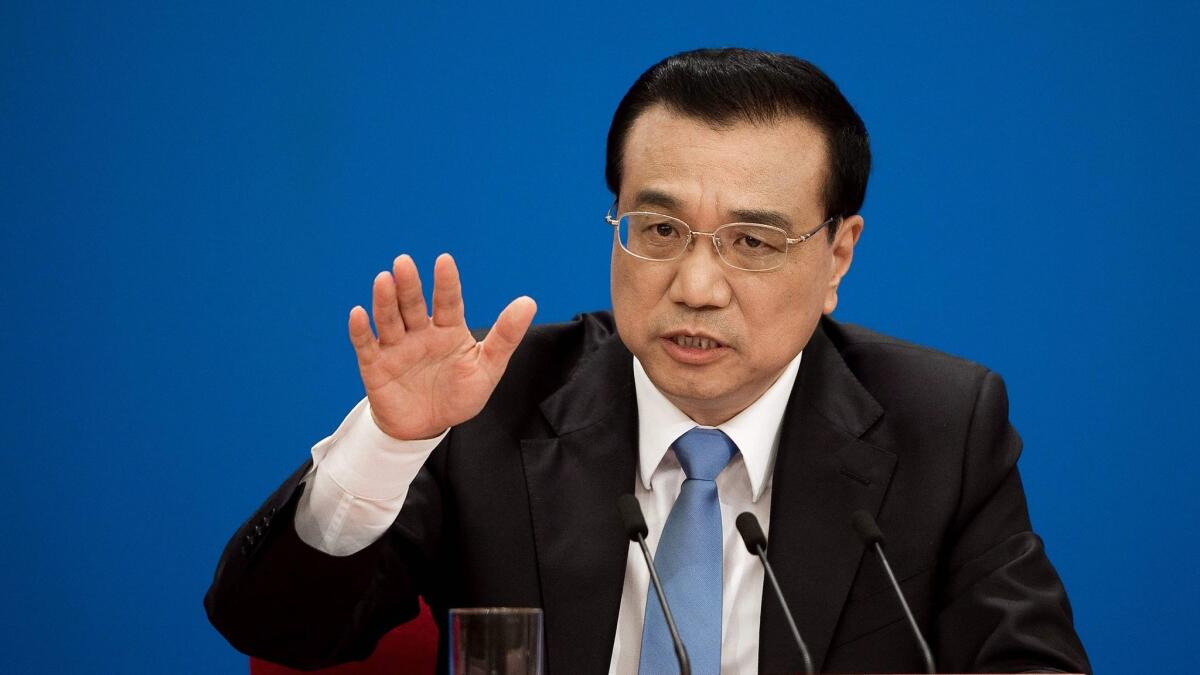China cautions U.S. against starting a trade war, casting itself as champion of globalization

Reporting from BEIJING — China’s premier Li Keqiang cautioned the U.S. against starting a trade war and positioned Beijing as a leading proponent of globalization at a press conference Wednesday, underscoring the extent to which Donald Trump’s presidency has pushed the country into a global leadership role.
“We don’t want to see a trade war breaking out,” Li said at the news conference, a highly scripted annual ritual in a gold-bedecked meeting room at Beijing’s Great Hall of the People. American companies, he said, would suffer the most in a trade battle between the world’s two largest economies.
Li, China’s second-highest-ranking official after President Xi Jinping, framed the U.S.-China relationship as having “bright prospects,” adding that officials were working to arrange a meeting between Xi and President Trump. (He did not confirm media reports that it would take place at Trump’s Florida resort Mar-a-Lago in early April).
His rhetoric marked a stark departure from last year’s news conference, when Li barely mentioned globalization and took only one question in regard to China’s role in the global economy.
“As for how to ensure the healthy development of China-U.S. ties, I believe both countries need to act in keeping with the principles of equality and mutual benefit,” he said, reiterating a long-held party line.
I believe both countries need to act in keeping with the principles of equality and mutual benefit.
— Li Keqiang, China’s premier
The premier’s news conference, held every year, is at its heart an act of political theater — questions are pre-selected, Li’s responses well-rehearsed. Yet the government’s choice of topic matter provides some insight into its most pressing concerns.
Li, in a question-and-answer session that lasted nearly two hours, downplayed fears about structural risks to China’s economy, pledged to “fight and win a battle on smog,” and advocated for economic cooperation between the mainland and Hong Kong. He also projected an image of China as open to foreign investment, and as a leader in globalization and free trade.
“China will continue to remain engaged in the liberalization of global trade,” he said. “We believe that it is important for one to see the opportunities of opening up in globalization.”
China faces a slew of domestic problems — critics say that its human rights record, censorship, and business environment for foreign enterprises have worsened since Xi took power in late 2012. Tensions over the South China Sea and Taiwan continue to escalate.
Trump’s “America First” foreign policy doctrine — and his harsh tone on China, both as a presidential nominee and now as president — have sparked fears of an economic showdown.
Trump has accused China of manipulating its currency, economically “raping” the U.S. and creating “the concept of global warming” as a hoax to undercut U.S. manufacturing. His top advisor on trade is Peter Navarro, a hawkish business professor at UC Irvine who directed a documentary called “Death by China.”
Moreover, Trump’s public disparagement of multilateral institutions such as the North Atlantic Treaty Organization, the United Nations, and the Paris Climate Change Pact have pushed China into a role as the world’s foremost defender of multilateral institutions, global trade, and the fight against climate change.
China, a major beneficiary of international trade, has sought to present itself as a force for global stability. In January, Xi called for “openness” and economic integration at the World Economic Forum in Davos, Switzerland, marking the first time China’s top leader has addressed the meeting of global elites.
The state-run New China News Agency, in an editorial on Monday, took a thinly veiled swipe at the Trump administration. “Xi’s experience, commitment, determination and ability to govern and lead have become something of a rarity on the global political stage,” it said.
Li’s press conference capped off China’s annual “Two Sessions,” a concurrent meeting of the country’s top legislature — the National People’s Congress — and the Chinese People’s Political Consultative Conference, a political advisory body.
Steve Tsang, Director of the China Institute at the School of Oriental and African Studies in London, said that this year’s meetings were “reassuringly dour,” a reminder that the party’s greatest dramas are playing out behind the scenes.
At Li’s press conference, no reporters addressed Internet censorship or human rights. Li also made no mention of the 19th Party Congress, a major Communist party meeting to be held later this year which will see changes in the top leadership.
Xi is already China’s most powerful leader in decades. If he does not promote a clear successor this year, Tsang said, he may be gearing up to extend his tenure beyond 2022. “This is an arrangement that’s facing a lot of resistance within the party,” he said.
“Nothing much actually happened [at the Two Sessions], and that’s what was meant to be,” Tsang continued. “The big event this year is the 19th Party Congress. It’s going to be so big — and so much is not yet decided — that nobody really wants to take any risks.”
Meyers is a special correspondent.
For more news from Asia, follow @JRKaiman on Twitter
More to Read
Sign up for Essential California
The most important California stories and recommendations in your inbox every morning.
You may occasionally receive promotional content from the Los Angeles Times.










